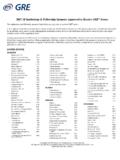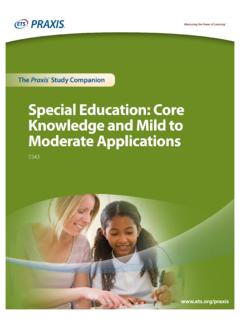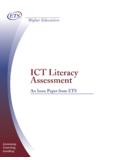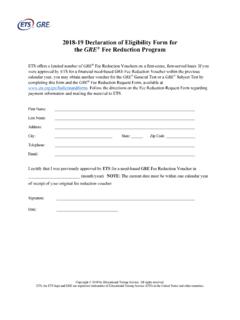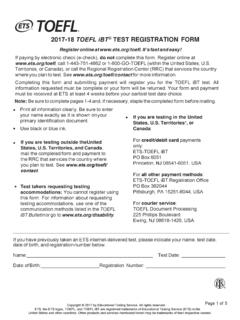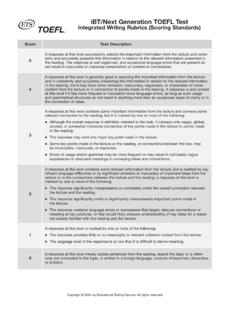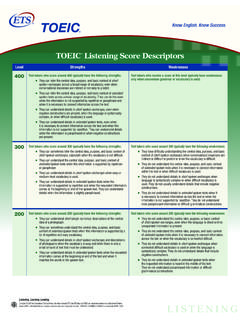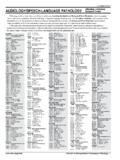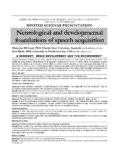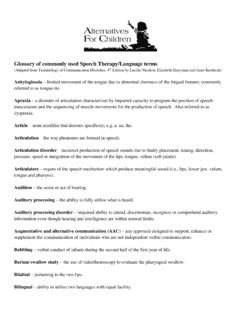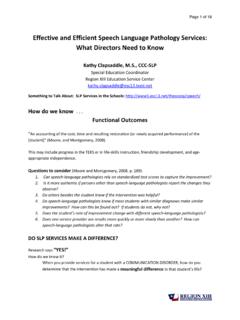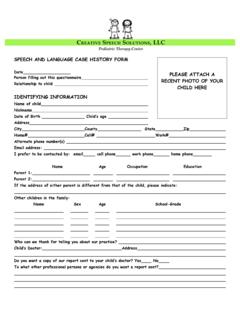Transcription of Speech-Language Pathology - ETS Home
1 Speech-Language Pathology Praxis Study CompanionThe Praxis Study Companion2 Welcome to the Praxis Study CompanionWelcome to The Praxis Study Companion Prepare to Show What You KnowYou have been working to acquire the knowledge and skills you need for your teaching career. Now you are ready to demonstrate your abilities by taking a Praxis test. Using The Praxis Series Study Companion is a smart way to prepare for the test so you can do your best on test day. This guide can help keep you on track and make the most efficient use of your study Study Companion contains practical information and helpful tools, including: An overview of the Praxis tests Specific information on the Praxis test you are taking A template study plan Study topics Practice questions and explanations of correct answers Test-taking tips and strategies Frequently asked questions Links to more detailed informationSo where should you start?
2 Begin by reviewing this guide in its entirety and note those sections that you need to revisit. Then you can create your own personalized study plan and schedule based on your individual needs and how much time you have before test in mind that study habits are individual. There are many different ways to successfully prepare for your test. Some people study better on their own, while others prefer a group dynamic. You may have more energy early in the day, but another test taker may concentrate better in the evening. So use this guide to develop the approach that works best for teaching career begins with preparation. Good luck!Know What to ExpectWhich tests should I take? Each state or agency that uses the Praxis tests sets its own requirements for which test or tests you must take for the teaching area you wish to you register for a test, confirm your state or agency s testing requirements at are the Praxis tests given?
3 Praxis tests are given on computer. Other formats are available for test takers approved for accommodations (see page 41).The Praxis Study Companion3 Welcome to the Praxis Study CompanionWhat should I expect when taking the test on computer?When taking the test on computer, you can expect to be asked to provide proper identification at the test center. Once admitted, you will be given the opportunity to learn how the computer interface works (how to answer questions, how to skip questions, how to go back to questions you skipped, etc.) before the testing time begins. Watch the What to Expect on Test Day video to see what the experience is and when are the Praxis tests offered?You can select the test center that is most convenient for you. The Praxis tests are administered through an international network of test centers, which includes Prometric Testing Centers, some universities, and other locations throughout the schedules may differ, so see the Praxis Web site for more detailed test registration information at The Praxis Study Companion4 Table of ContentsTable of ContentsThe Praxis Study Companion guides you through the steps to success1.
4 Learn About Your Test ..5 Learn about the specific test you will be taking2. Familiarize Yourself with Test Questions ..8 Become comfortable with the types of questions you ll find on the Praxis tests3. Practice with Sample Test Questions ..12 Answer practice questions and find explanations for correct answers4. Determine Your Strategy for Success ..22 Set clear goals and deadlines so your test preparation is focused and efficient5. Develop Your Study Plan ..25 Develop a personalized study plan and schedule6. Review Study Topics ..29 Detailed study topics with questions for discussion7. Review Smart Tips for Success ..39 Follow test-taking tips developed by experts8. Check on Testing Accommodations ..41 See if you qualify for accommodations that may make it easier to take the Praxis test9. Do Your Best on Test Day ..42 Get ready for test day so you will be calm and confident10. Understand Your Scores ..44 Understand how tests are scored and how to interpret your test scoresAppendix: Other Questions You May Have.
5 46 The Praxis Study Companion5 Step 1: Learn About Your Test1. Learn About Your TestLearn about the specific test you will be takingSpeech- language Pathology (5331)Test at a GlanceTest Name Speech-Language PathologyTest Code 5331 Time 150 minutesNumber of Questions 132 Format Selected-response questionsTest Delivery Computer delivered Approximate Approximate Content Categories Number of Percentage of Questions Examination I. Foundations and Professional Practice 44 33 % II. Screening, Assessment, Evaluation, and 44 33 % Diagnosis III. Planning, Implementation, and 44 33 % Evaluation of TreatmentIIIIIIA bout This TestThe Speech-Language Pathology test measures knowledge important for independent practice as a Speech-Language pathologist in all primary employment settings, including schools, hospitals, clinics, private practice, etc.
6 The examination is typically taken by examinees who are in or who have completed a master s degree program. Recognized as the national examination in Speech-Language Pathology , the test is one of several requirements for the Certificate of Clinical Competence issued by the American Speech-Language -Hearing Association (ASHA). The test is also used by state boards that license Speech-Language pathologists, and by state agencies that license Speech-Language pathologists to work in school settings. Examinees may obtain complete information about certification or licensure from the authority or state or local agency from which certification or licensure is sought. (ASHA can be found at )The 132 selected-response test questions assess foundational knowledge, knowledge of professional practice, and specialized knowledge as it is applied across practice ranging from screening and assessment to treatment and treatment evaluation.
7 The questions test knowledge and its application across the big nine areas of practice: speech sound production; fluency; voice, resonance, and motor speech ; receptive and expressive language ; social aspects of communication, including pragmatics; cognitive aspects of communication; augmentative and alternative communication; hearing; and feeding and swallowing The content of the test is based on a practice and curriculum analysis commissioned by ASHA: a national survey of Speech-Language pathologists in both clinical and educational test may contain some questions that will not count toward your Praxis Study Companion6 Step 1: Learn About Your TestThe distribution of the test questions across the areas of practice was based on a national survey, commissioned by ASHA, of Speech-Language pathologists in a variety of employment settings. The Speech-Language Pathology test is regularly updated to take into account new developments in the SpecificationsTest specifications in this chapter describe the knowledge and skills measured by the test.
8 Study topics to help you prepare to answer test questions can be found in 6. Review Study Topics on page Foundations and Professional PracticeA. Foundations1. Typical development and performance across the lifespan2. Factors that influence communication, feeding, and swallowing3. Epidemiology and characteristics of common communication and swallowing disordersB. Professional Practice1. Wellness and prevention2. Culturally and linguistically appropriate service delivery3. Counseling, collaboration, and teaming4. Documentation5. Ethics6. Legislation and client advocacy7. Research methodology and evidence-based practiceII. Screening, Assessment, Evaluation, and DiagnosisA. Screening1. Communication disorders2. Feeding and swallowing disordersB. Approaches to Assessment and Evaluation1. Developing case histories2. Selecting appropriate assessment instruments, procedures, and materials3. Assessing factors that influence communication and swallowing disorders4.
9 Assessment of anatomy and physiologyC. Assessment Procedures and Assessment1. speech sound production2. Fluency3. Voice, resonance, and motor speech4. Receptive and expressive language5. Social aspects of communication, including pragmatics6. Cognitive aspects of communication7. Augmentative and alternative communication8. Hearing9. Feeding and swallowingD. Etiology1. Genetic2. Developmental3. Disease processes4. Auditory problems5. Neurological6. Structural and functional7. PsychogenicThe Praxis Study Companion7 Step 1: Learn About Your TestIII. Planning, Implementation, and Evaluation of TreatmentA. Treatment Planning1. Evaluating factors that can affect treatment2. Initiating and prioritizing treatment and developing goals3. Determining appropriate treatment details4. Generating a prognosis5. Communicating recommendations6. General treatment principles and proceduresB. Treatment Evaluation1. Establishing methods for monitoring treatment progress and outcomes to evaluate assessment and/or treatment plans2.
10 Follow-up on post-treatment referrals and recommendationsC. Treatment1. speech sound production2. Fluency3. Voice, resonance, and motor speech4. Receptive and expressive language5. Social aspects of communication, including pragmatics6. Communication impairments related to cognition7. Treatment involving augmentative and alternative communication8. Hearing and aural rehabilitation9. Swallowing and feedingThe Praxis Study Companion8 Step 2: Familiarize Yourself with Test Questions2. Familiarize Yourself with Test QuestionsBecome comfortable with the types of questions you ll find on the Praxis testsThe Praxis Series assessments include a variety of question types: constructed response (for which you write a response of your own); selected response, for which you select one or more answers from a list of choices or make another kind of selection ( , by clicking on a sentence in a text or by clicking on part of a graphic); and numeric entry, for which you enter a numeric value in an answer field.
